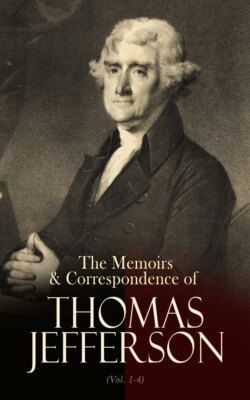Читать книгу The Memoirs & Correspondence of Thomas Jefferson (Vol. 1-4) - Thomas Jefferson - Страница 90
На сайте Литреса книга снята с продажи.
LETTER LXX.—TO JOHN ADAMS, July 7, 1785
ОглавлениеTable of Contents
TO JOHN ADAMS.
Paris, July 7, 1785.
Dear Sir,
This will accompany a joint letter enclosing the draft of a treaty? and my private letter of June 23rd, which has waited so long for a private conveyance. We daily expect from the Baron Thulemeyer the French column for our treaty with his sovereign. In the mean while, two copies are preparing with the English column, which Dr. Franklin wishes to sign before his departure, which will be within four or five days. The French, when received, will be inserted in the blank columns of each copy. As the measure of signing at separate times and places is new, we think it necessary to omit no other circumstance of ceremony which can be observed. That of sending it by a person of confidence, and invested with a character relative to the object, who shall attest our signature, yours in London, and Baron Thulemeyer’s at the Hague, and who shall make the actual exchanges, we think will contribute to supply the departure from the original form, in other instances. For this reason, we have agreed to send Mr. Short on this business, to make him a secretary pro hac vice, and to join Mr. Dumas for the operations of exchange, &c. As Dr. Franklin will have left us before Mr. Short’s mission will commence, and I have never been concerned in the ceremonials of a treaty, I will thank you for your immediate information as to the papers he should be furnished with from hence. He will repair first to you in London, thence to the Hague, and then return to Paris.
What has become of Mr. Lambe? Supposing he was to call on the commissioners for instructions, and thinking it best these should be in readiness, Dr. Franklin undertook to consult well the Barbary treaties with other nations, and to prepare a sketch which we should have sent for your correction. He tells me he has consulted those treaties, and made references to the articles proper for us, which, however, he will not have time to put into form, but will leave them with me to reduce. As soon as I see them, you shall hear from me. A late conversation with an English gentleman here, makes me believe, what I did not believe before; that his nation thinks seriously that Congress have no power to form a treaty of commerce. As the explanations of this matter, which you and I may separately give, may be handed to their minister, it would be well that they should agree. For this reason, as well as for the hope of your showing me wherein I am wrong, and confirming me where I am right, I will give you my creed on the subject. It is contained in these four principles. By the Confederation, Congress have no power given them, in the first instance, over the commerce of the States. But they have a power given them of entering into treaties of commerce, and these treaties may cover the whole field of commerce, with two restrictions only. 1. That the States may impose equal duties on foreigners as natives: and 2. That they may prohibit the exportation or importation of any species of goods whatsoever. When they shall have entered into such treaty, the superintendence of it results to them; all the operations of commerce, which are protected by its stipulations, come under their jurisdiction, and the power of the States to thwart them by their separate acts, ceases. If Great Britain asks, then, why she should enter into treaty with us? why not carry on her commerce without treaty? I answer; because till a treaty is made, no consul of hers can be received (his functions being called into existence by a convention only, and the States having abandoned the right of separate agreements and treaties); no protection to her commerce can be given by Congress; no cover to it from those checks and discouragements, with which the States will oppress it, acting separately, and by fits and starts. That they will act so till a treaty is made, Great Britain has had several proofs; and I am convinced those proofs will become general. It is then to put her commerce with us on systematical ground, and under safe cover, that it behoves Great Britain to enter into treaty. And I own to you, that my wish to enter into treaties with the other powers of Europe, arises more from a desire of bringing all our commerce under the jurisdiction of Congress, than from any other views. Because, according to my idea, the commerce of the United States with those countries not under treaty with us, is under the jurisdiction of each State separately; but that of the countries which have treated with us, is under the jurisdiction of Congress, with the two fundamental restraints only, which I have before noted.
I shall be happy to receive your corrections of these ideas, as I have found, in the course of our joint services, that I think right when I think with you.
I am, with sincere affection, Dear Sir,
your friend and servant,
Th: Jefferson.
P.S. Monsieur Houdon has agreed to go to America to take the figure of General Washington. In the case of his death, between his departure from Paris and his return to it, we may lose twenty thousand livres. I ask the favor of you to inquire what it will cost to ensure that sum on his life, in London, and to give me as early an answer as possible, that I may order the ensurance, if I think the terms easy enough. He is, I believe, between thirty and thirty-five years of age, healthy enough, and will be absent about six months. T.J.
